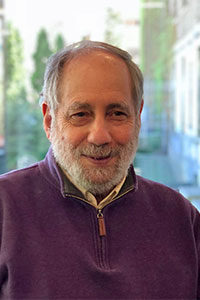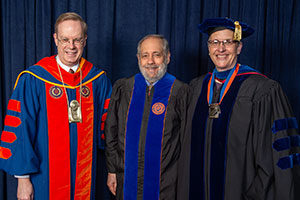The School of Education held its 42nd Annual Convocation ceremony on Saturday, May 12, 2018. The School awarded 141 bachelor’s degrees, 119 Master’s degrees, 33 Certificates of Advanced Study, and 17 doctoral degrees. Additionally, 10 students from the InclusiveU program graduated.
The Convocation address was given by Kenneth M. Zeichner G’70, G’76, who also received an honorary Doctor of Humane Letters from Syracuse University at Sunday’s Commencement ceremonies.
On Friday, May 11, the School of Education hosted an informal talk in the Jacquet Education Commons for Zeichner and School of Education faculty, graduate students, and undergraduate students.
After obtaining a master’s degree in urban education and a Ph.D. from the School of Education, Zeichner worked as a teacher educator and team leader in the National Teacher Corps. He was a professor at the University of Wisconsin-Madison for 33 years, where he long served as the associate dean for teacher education and international education and as the Hoefs-Bascom Professor of Teacher Education. In 2009, Professor Zeichner moved to the University of Washington-Seattle, where he holds the Boeing Chair of Teacher Education and teaches graduate courses in the study of teacher education.
Zeichner’s early research looked at group memberships in classrooms and the perspectives of new teachers toward teacher education. By the mid-1990s, he was well known as one of the most vocal critics of the socialization that occurred in most teacher education trajectories of the time, arguing for teachers’ and teacher educators’ use of research and critical reflection to address inequities in pedagogical practice. His current work explores the role of venture philanthropy in teacher education policies and practices; on formulating hybrid teacher education programs that combine campus, school and community expertise; and on approaches to teacher education used globally, serving as primary reviewer for programs around the world.
Ken Zeichner’s School of Education Convocation Remarks
 Good afternoon graduates. It is a real honor for me to have been invited to share in your celebration of your academic achievements today with your family and friends. Being able to be here with you today is especially gratifying because even though I have two degrees from this wonderful university, I was not able to attend either of my own graduation ceremonies in 1970 and 1976.
Good afternoon graduates. It is a real honor for me to have been invited to share in your celebration of your academic achievements today with your family and friends. Being able to be here with you today is especially gratifying because even though I have two degrees from this wonderful university, I was not able to attend either of my own graduation ceremonies in 1970 and 1976.
Forty-Nine years ago, I arrived at Syracuse University from my home in Philadelphia to begin my preparation for what would become a long career in public education, first as an elementary school teacher at Merrick and Martin Luther King elementary schools in Syracuse, and then as a university teacher educator and administrator at the University of Wisconsin-Madison and the University of Washington-Seattle.
In July 1969, I began my 13-month master’s degree program (The Urban Teacher Preparation Program) to prepare to be a public school teacher. This program, funded by the Ford Foundation, was one of many across the country designed to bring liberal arts graduates into teaching in urban schools in neighborhoods highly impacted by poverty. Following my internship year at Merrick school, I continued teaching there (and at King school in the summers) until 1975, and during this time, I was hired as a teacher educator by the Syracuse National Teacher Corps Project (an outgrowth of the Peace Corps) where I stayed in Merrick School and supervised a team of graduate student interns who were learning to become urban teachers. I was jointly employed by SU and the school district.
What I learned in the Urban Teacher Preparation Program, The Syracuse Teacher Corps Project (which was a partnership between SU’s School of Education and the Syracuse School District), in teaching at Merrick and King Schools, and in my doctoral program at SU under the supervision of Art Blumberg shaped my whole career in important ways.
For example, I was placed as a teacher intern in Merrick school that along with King school had been transformed into public community schools where teachers, parents, and other community members helped to govern the school, hire and evaluate teachers, and participate in decisions about the allocating school resources through local school councils. This work was designed through a collaboration involving two SU Education professors Art Blumberg and Bill Wayson in response to community dissatisfaction in prior years with the quality of education offered to their children.
My experience teaching in public schools that made a strong and genuine effort to become resources for their communities and to engage community members in making key decisions about their schools led me to enroll in the doctoral program at SU to learn from Art Blumberg and others how to work as a public school educator and teacher educator in respectful and collaborative ways with people in the schools and neighborhoods in which I taught and prepared teachers to teach in.
Because of my experience at SU and in Syracuse schools, I became committed early on to the idea of community teachers working with and for communities and not on them or trying to save students from their communities. I learned as a white teacher in primarily African American neighborhoods the value for all teachers of making a serious effort to learn about the community in which I taught and of forming trusting and respectful relationships with my students and their families.
All interns and teachers in my school were all required to visit with the families of all of our students each year before the school year started, and I learned from my relationships with my students’ families, and other community members what their hopes and dreams were for their children’s education, and how important it is for teachers to recognize and learn from the expertise that exists in families and in the community. I learned the importance in my first years as a teacher of building in positive ways on the cultural and linguistic resources that my students brought to school.
A second example of what I learned from my education at SU comes from the nature of my teacher education program and the school in which I did my internship and spent the early part of my career. Many of the courses in my teacher education program were co-taught by experienced Syracuse School District staff and SU faculty or by school staff who had been carefully selected as clinical faculty. This experience taught me not only the importance of contextualizing teaching and teacher preparation in specific contexts-it also taught me to recognize and value the expertise of classroom teachers and administrators in solving persistent educational problems- that teachers should not be positioned as passive receivers of expert knowledge from universities, but as those who have knowledge and expertise themselves that can benefit others. The many years I have spent supporting the research of educational practitioners about their own work and helping to disseminate what they learned through systematic reflection and study of their practice was seeded in my early years at SU.
Today this kind of school-based university teacher preparation that seeks to engage the expertise of people in schools and communities to work alongside faculty in universities is seen as cutting edge work and what the field should look like in the future. The SU Urban Teacher Preparation Program provided me with this now cutting edge experience back in 1969 and 1970.
I learned early on in my studies at SU about the importance of humility and of being open to listening to and working with those who have a stake in the quality of education even if they disagree with me. Enduring education problems are very complex and require expertise that exists in different places. It is very easy for those of us educated in high quality universities like SU to lose sight of the limits of our own knowledge and expertise. The most important thing that SU taught me is to stay open minded about what I think I know, and be willing to continue learning from others, and from my experiences. Throughout my career, I have sought to educate my students- teachers and teacher educators- in the way that SU educated me.
I have been gone from SU for a long time. In one of my graduate educational psychology classes, there was another student named Jim Boeheim, who was then an assistant men’s basketball coach. Now he is one of the legendary NCAA basketball coaches in the county.
For 34 years, I was a Badger, and then for the last nine, a Husky. I have never forgotten though that I am one of the Orange. Congratulations on your academic achievements that you are celebrating today and for choosing to become or to continue as an educator. Being an educator is one of the most important ways we can try to make our contribution to making this world a better place for everyone who inhabits it.

